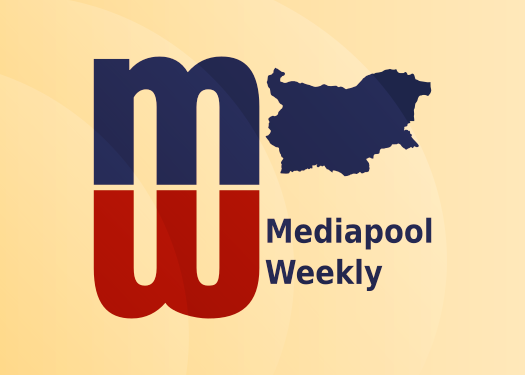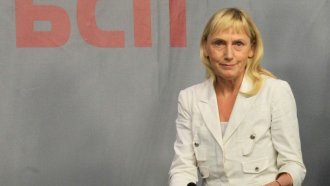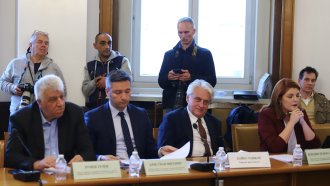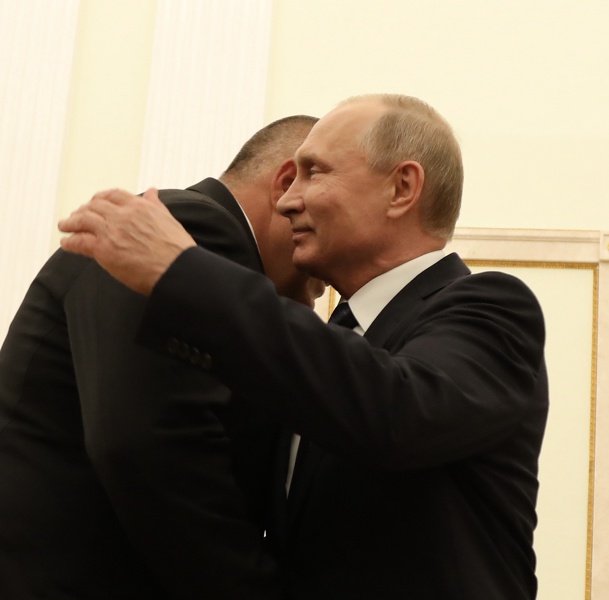
Bulgarian Prime Minister Boyko Borissov and Russian President Vladimir Putin
Editorial: Putin Forgave Us - Ten Days That Took Bulgaria 10 Years Back
Reviving relations with Russia has become the top priority of the Bulgarian government once again even in the midst of its Presidency of the Council of the EU. After a long pause at the top level relations between the two countries, which coincided with the cancelation of three major Russian energy projects from the so-called Grand Slam - NPP Belene, the South Stream gas pipeline and the Burgas-Alexandroupolis oil pipeline – in less than two weeks the Bulgarian President and Prime Minister managed to both visit Russia for meetings with Russian President Vladimir Putin and Prime Minister Dmitri Medvedev. Both had a similar agenda: to reboot the canceled Russian energy projects for a gas pipeline and for NPP Belene. A short version of the Grand Slam. The Grand Slam was negotiated by Putin and the pro-Russian Then-President Georgi Parvanov in 2008. The events of the past two weeks close a policy circle spanning over the course of a decade. A period in which Bulgaria failed to free itself from its energy dependency on Russia.
President Radev and PM Borissov went to Moscow carrying similar messages but their plans were not developed in partnership. On the contrary: the competition between the two for who wins over Putin’s graces was yet another dividing line between the institutions. Radev’s visit was planned for a long time and was to serve as a wreath to his efforts to bring the two countries closer. An agenda, which Radev has championed since campaigning for office. The leading story his visit produced, however, was that a visit from PM Borissov to Russia was to follow almost immediately. Borissov was the one expected to carry-out the concrete negotiations. After his return in Sofia Radev admitted he had learnt the news from the media and had no prior knowledge about Borissov’s visit. He made it clear that the Cabinet had refused to send ministers with his delegation to Moscow, which prevented him from achieving concrete results.
Borissov brought ministers and journalists to accompany him during his meetings with Putin in the Kremlin. There Borissov received the pleasing news from Putin that the second deviation of the Turkish Stream gas pipeline – for transiting Russian gas to Europe - will be directed to Bulgaria instead of Greece, as was the initial plan. Borissov described this as a successful breakthrough for his efforts to build a gas hub on the Bulgarian coast. The project for the hub has been Borrisov’s priority for a while. The European Commission supports the hub but only under the condition the hub has at least three separate gas suppliers. So even if Russia agrees to supply the hub with gas Borissov still has to find three other suppliers, as well as clients ready to purchase it.
Apart from this Gazprom’s intention is to use Bulgaria as transit territory for gas for Serbia and the EU, not to give Bulgaria the opportunity to trade it via its hub.
This is why Borissov’s visit in Moscow, pronounced by Bulgarian media as “historic” could hardly live up to its label, as much as the PM would like it. He did everything in his power to make Putin like him. He assumed the fault for stoping NPP Belene, which was canceled during his first term for being “unprofitable” and “a corruptive scheme”. He also apologized for the South Stream – a project which Putin canceled as Brussels wouldn’t allow for violating EU laws. Borissov announced that Putin had forgiven him because he is the older brother.
The question remains what is the price that Bulgaria would have to pay for this “forgiveness” and wouldn’t it be overpriced not just in the literal sense but also in terms of the national interest.

Boyko Borissov's First Official Visit to Russia as Prime Minister
Bulgarian Prime Minister made his first official visit to Russia where he met with Russian PM Dmitri Medvedev and Russian President Vladimir Putin. This is the third time Putin and Borissov meet in the former's four terms as president and one as PM and the latter's three terms as PM. Putin visited Bulgaria in 2008 and they once met at a summit in Gdansk in 2009, honoring an anniversary of the end of World War II.
Bulgarian President Roumen Radev was on an official visit to Russia the week before. He discussed predominantly the renewal of building NPP Belene and building a direct gas pipeline linking Russia and Bulgaria, which he called Bulgarian Stream. The idea for the pipeline was to 'replace' the discontinued South Stream, which went through Bulgaria. Later the so-called Bulgarian Stream was quickly renounced by Russian government spokespeople. Talks of NPP Belene were left for Borissov to conclude during his visit the following week.
Dmitri Medvedev first broke the news about Borissov's visit to Russia after his meeting with President Radev, saying that Russia is expecting Borissov’s visit soon. The mention about a supposed meeting surprised many as this was the first time it had been brought up. Later this was reaffirmed by Putin after his meeting with Radev. Bulgarian Foreign Ministry was quick to state the meeting had been scheduled months in advance. However, the way the news broke left many media and observers in Bulgaria to speculate that Borissov's visit is only ad hoc damage control of Medvedev's and Putin's announcement about expecting Borissov by the end of the month.
As NPP Belene was one of Radev's main topics during the visit and afterward, and as Borissov and his Cabinet have recently warmed to the notion of renewal, it seemed that he would take the conversation further in Russia. Before the visit, however, sources told Mediapool that Borissov's priority will not be NPP Belene at all. Actually, he had no intention of even bringing it up. Instead, he was going to try to secure gas for the gas hub he had been working on pushing forward for some time.
Indeed, this turned out to be the case. Borissov tried to negotiate Russian gas for the future hub and it seemed he succeeded in part. It was announced that the Turkish Stream would be the route that would feed the hub by making a turn and entering Bulgarian territory. Specifically, the gas would flow through the second Turkish Stream pipeline through the Black Sea and the Bulgarian-Turkish border. Putin announced that he had spoken with Turkish President Erdogan who had given his OK. During the regular briefing after the Borissov Putin meeting Borissov said:
"The most important question was whether there will be a second entry point of the Turkish Stream to Bulgaria. Putin and the Turkish President have no objection to this. There was a different route before but I want to express gratefulness for this decision on behalf of the Bulgarian people. Yes, [the gas] could've come directly to Bulgaria via South Stream but those circumstances are in the past".
He said a direct gas pipeline from Russia to Bulgaria is impossible "but if Bulgaria becomes a stable and predictable distribution center for Europe we can talk about a new pipeline. It will cost around 9 billion euro."
Borissov told journalists that he had insisted half the gas from Turkish Stream to supply the hub. This would satisfy EU regulations in part. However, another point must also be addressed. According to the rules, the gas for the hub would have to have at least three suppliers.
He went on to say that Gazprom had pardoned Bulgaria an 800-million-euro debt. In fact, Gazprom not so much pardoned Bulgaria debt but was forced by the European Commission (EC) to give up on penalties as part of a deal which helped Gazprom avoid enormous fines for violating EU's Third Energy Package.
Borissov continued to speak rather apologetically about the cancelation of South Stream. When Putin announced the end of South Stream 2014 he pointed at Bulgaria as the cause even though key countries (Italy and Austria) had already pulled out from the project at the time.
Putin answered Borissov in reassuring tones:
"We regret what happened with South Stream, I see that Bulgaria regrets it too because the project would've been very profitable. We are ready to be part of the realization of the new route."
Overall, Borissov declared the negotiations a success. The Turkish Stream would likely enter Bulgarian territory and supply the Balkan hub. Late Wednesday, however, the Kremlin Spokesperson Dmitry Peskov was not so affirming:
"The Bulgarian side has shown definite interest [in being part of a joint energy project] but no concrete talks have been conducted, nor were such possible [during this visit]. It was not part of the agenda."
He was due to return on Thursday, May 31 but came back to Bulgaria a day early.
Back in Bulgaria Bulgarian Socialist Party (BSP) leader Korneliya Ninova expressed disappointment that the visit produced "no real result".
"We were expecting something concrete from this visit ... I think Borissov went to Russia to secure gas for the Balkan hub but failed to deliver. Shelving South Stream and NPP Belene will obviously cost us a lot. Mr. Borissov attempted to correct his own mistakes in canceling these projects but failed. He seeks Mr. Putin's forgiveness but for us, it is more important he apologizes to the Bulgarian people for the missed revenues and national Bulgarian interest." she said.
Deputy PM and Financial Minister Vladislav Goranov said on Friday that there was no instance of begging of forgiving during the visit. In his words, the talks between Borissov and Putin were “ˆbetween partners”.
Asked if Turkish Stream entering Bulgaria was negotiated he said:
“It has been negotiated politically. We are now working on the technicalities.”
“Bularia’s and Russia’s interests coincide. We have to guarantee that Bulgaria is a player in the transit of Russian gas to Europe. We also must guarantee that if transit through Ukraine becomes impossible we would have enough reserves to keep the economy going. ”

GERB and BSP Eager to Restart NPP Belene
Parliament will vote to approve lifting the moratorium over NPP Belene next week. The government and PM Boyko Borissov have been pushing for this claiming it is the only way to begin a procedure to select a strategic investor. Both the Bulgarian Socialist Party (BSP) and GERB agreed on this during the discussions in Parliament Thursday, which were dedicated to Energy Minister Temenuzhka Petkova's report on NPP Belene. The report explores ways of rebooting NPP Belene.
Petkova's report was subject to over two hours of discussions. Besides the proposals outlined in the report members of parliament brainstormed additional approaches as well.
Tmenuzhka Petkova, who back in 2012 led an audit of the then-active project for NPP Belene which declared it a corruption scheme, was passionately defending the renewal now. According to her the project today is entirely new and different.
With GERB and BSP (the largest opposition party in Parliament) definitely supporting the project's restart the motion will most likely pass.
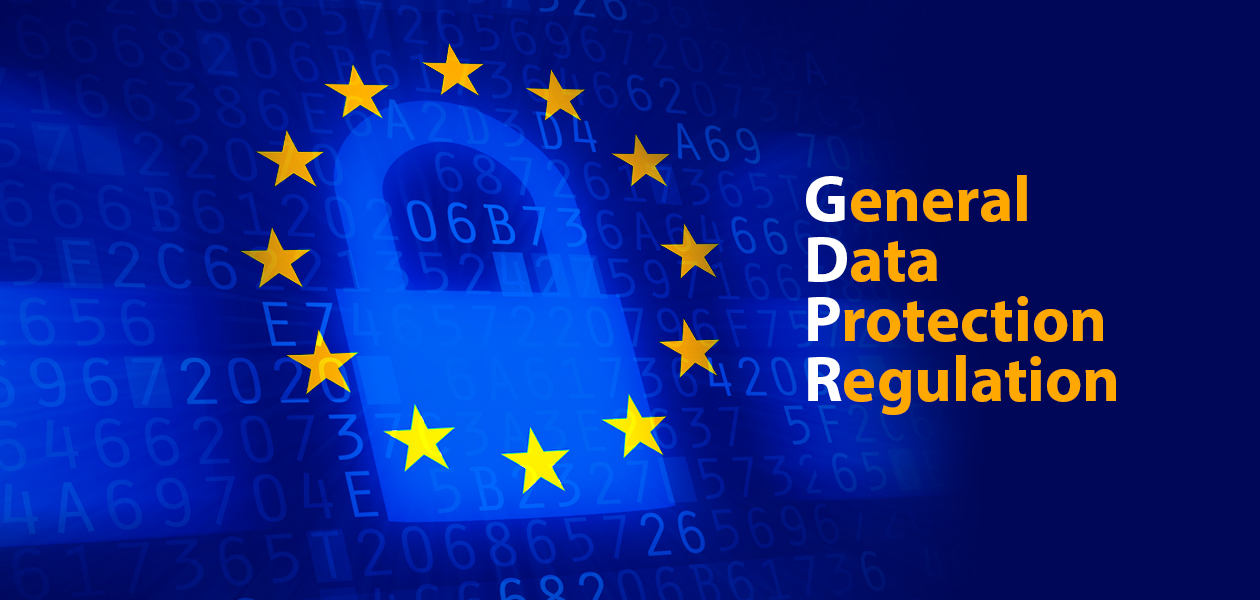
Public Information in the Justice System is Being Classified. The Pretext - GDPR
Key bodies from the justice system structure have classified public information concerning cases. According to them the measures are required to satisfy the General Data Protection Regulation (GDPR). Names of convicted, prosecuted, investigated and indicted persons have all been classified, Sega Daily reports.
The Anticorruption Commission recently began conducting a probe into Agricultural Minister Roumen Porzhanov. In its press release, the press office of the Commission had omitted his name and position altogether.
At the same time, the Sofia Regional Court has disabled the option to search for cases by name of defendant or plaintiff.
A simple check of the GDPR shows without a doubt that there are no requirements for classifying public information of this kind. Journalists especially are an exception to some rules guarding private data, including this one. But the government is prompt in taking GDPR notions to the extreme and there is a real risk of censorship masked as accordance with GDPR.
Earlier this week the European Journalists’ Association (EJA) and the Access to Information Program (PDI) both warned that the Bulgarian adaptation to the new EU personal data protection regulation GDPR might jeopardize press freedom in Bulgaria. Bulgarian law is being adapted to the GDPR through amendments to the Personal Information Act. The amendments are prepared by the Personal Data Commission but are still not submitted to Parliament.
The EJA assess that the proposed amendments contradict the constitution and go against the fundamental right of freedom of speech.
“The bill postulates an unacceptable obligation for journalists to reveal their sources at the Personal Information Commission’s request.”
The EJA reminded that the European Court of Human Rights has declared revealing journalists’ sources as a risk to journalism.
“It is unacceptable for a body of the structure of the executive branch to have the authority to sanction journalists for not revealing their sources.”
The bill specifies a minimum fine of 10’000 leva for such cases.
“It is completely inappropriate for such high fines to exist in the poorest EU country. Such fines could have devastating consequences for small media, especially regional media. The bill poses a serious risk to pluralism.”
PDI experts have similar concerns. Alexandar Kashamov, the organizations’ chief lawyer said to Mediapool:
“The Bulgarian bill for amending the Personal Information Act contains texts that might have been written with good intentions but do generate concerns they will have serious negative effects on the media. If the bill is adopted every journalist will have to do a preliminary 10-step evaluation whether their reporting violates the law.”
Journalists will have to assess on a case-to-case basis if the people their reports are about are public figures and whether their reporting truly is of public interest, whereby legitimizing the disclosure of personal data. Press photography will also be subjected to the same process.
“Using public registries is also at risk because, in order to access information on them, personal data must be submitted. Even profiling persons of public interest fall under this bill.”
“The European directive is clear that certain obligations of handling personal data do not apply to journalism This solves the problem.”
The Bulgarian bill, however, does not provide for this exception.
Kashamov expressed concern that the omission might be on purpose.
“This bill is in line with the Personal Information Commission’s current practice of treating the media as a regular administrator of personal data and not as media. It isn’t relative what the actual intent is. The matter is, this bill – if it becomes a law – can be used [for pressuring journalists] … Things are not looking good.”

Constitutional Court to Rule on the Istanbul Convention Before Summer Break
The Constitutional Court will rule on the Istanbul Convention at the end of July. Mediapool sources say that the court will likely rule that the document is not consistent with the constitution: that it is controversial, badly translated and terminologically vague.
Some judges from the Constitutional Court held the opinion that the Convention "introduces a status that is unfamiliar and unclear in Bulgarian law", and therefore is incompatible with the constitution. Furthermore, they assess, the introduction of the term gender* will give way for legalizing same-sex cohabitation. This in their view would violate Article 46 of the constitution, which defines marriage as between a man and a woman.
The Convention, which deals with domestic abuse and abuse against women spiked a polemic across the country. The Convention was deemed unacceptable especially from right-wing parties and the Bulgarian Socialist Party. At the time GERB decided to pull the Convention from Parliament and submit it to the Constitutional Court to rule on its constitutionality.
* There is no clear translation for the term gender in Bulgarian. There is only a word for sex (male/female). The document translates gender as "social (as in socially constructed) sex". The Bulgarian translation of Judith Butler's Gender Trouble, for example, uses generic sex, which is even vaguer. The term as such is only recognizable in academic circles but not used even there.

UNESCO Reaffirms Environmentalists' Concerns About Pirin National Park
UNESCO’s experts have reaffirmed that environmentalists’ concerns about the new management plan for the national park For The Nature Association informed. UNESCO will vote on a draft decision regarding the plan at the annual meeting of the organization in June 2018 in Bahrein. For The Nature Association disseminated the document, along with a report by the International Union for Conservation of Nature (IUCN), following a mission the IUCN carried out in Pirin.
UNESCO's draft decision calls for the Bulgarian government not to implement the amendments to the management plan of Pirin National Park before they have undergone an environmental impact assessment. The new plan was adopted last December.
The Bulgarian government will have to present the environmental assessment to UNESCO when ready. The amended plan stipulates for expanding the park territory where construction is permitted 12,5 times and for permits logging in 60% of the park forests.
In addition, the Association shared a report by the IUCN from their mission in Pirin, which highlights that the management plan should not just be a framework document but must instead be specific on what is and is not allowed on the territory of the park. The report further insists that the overall vision for ski development should be an integrated part of the plan, and stresses - too - that the plan must undergo an environmental impact assessment.
Pirin National Park is a UNESCO World Heritage Site.

Roumen Rousev
Sofia Council Appoints Fired Deputy Mladost Mayor for Acting Mayor Position
Sofia Council has appointed Roumen Rousev - whom Dessisslava Ivancheva fired to become acting mayor of Mladost. Ivancheva is under indictment and incarcerated with corruption charges.
Ivancheva, her deputy Bilyana Petrova and ex Mladost mayor Petko Dyulgerov were arrested April 17 with a 70’000-leva bribe. The prosecution claims the bribe was intended for Ivancheva. However, till now no actual evidence has been submitted that Ivancheva actually requested the bribe. She herself denies all of it and claims she is a victim of a plot against her.
The Special Court recently removed her from office as a loophole in legislation permits her to govern the municipality regardless of the trial against her.
The court ruled in favor of the motion but the ruling is being appealed. The Appeal Court will decide on the case June 5.
Her firing Roumen Radev, which was done after her arrest, served as reasoning behind the prosecutions’ motion to remove her from office.
Roumen Radev was chosen to become acting mayor against Ivancheva’s pick – her spokesperson Petar Karzhilov.

Financial Ministry to Inject Additional 20 Million Leva to Save Bulgarian Railways from Bankruptcy
The Financial Ministry will inject 20 million leva in the railway state company BDZH to save it from bankruptcy. The injection comes four months after the state-financed BDZH with another 31 million leva to cover bond costs from 2007.
The new 20 million will provide for a fiscal reserve. The amount will be covered by the expected revenue from the Sofia Airport concession.
This loan, as the previous one, is interest-free but must be returned.
Financial Minister Vladislav Goranov said that BDZH will need an additional 80 million, which most likely will be approved.
BDZH’s debts amount to 390 million leva, which were supposed to be paid off by the end of 2018 but apparently, the state of the company does not permit for that.
За честна и независима журналистика
Ще се радваме, ако ни подкрепите, за да може и занапред да разчитате на независима, професионална и честна информационно - аналитична медия.
 0 коментара
0 коментара
Екипът на Mediapool Ви уведомява, че администраторите на форума ще премахват всички мнения, съдържащи нецензурни квалификации, обиди на расова, етническа или верска основа.
Редакцията не носи отговорност за мненията, качени в Mediapool.bg от потребителите.
Коментирането под статии изисква потребителят да спазва правилата за участие във форумите на Mediapool.bg
Прочетете нашите правила за участие във форумите.
За да коментирате, трябва да влезете в профила си. Ако нямате профил, можете да се регистрирате.
